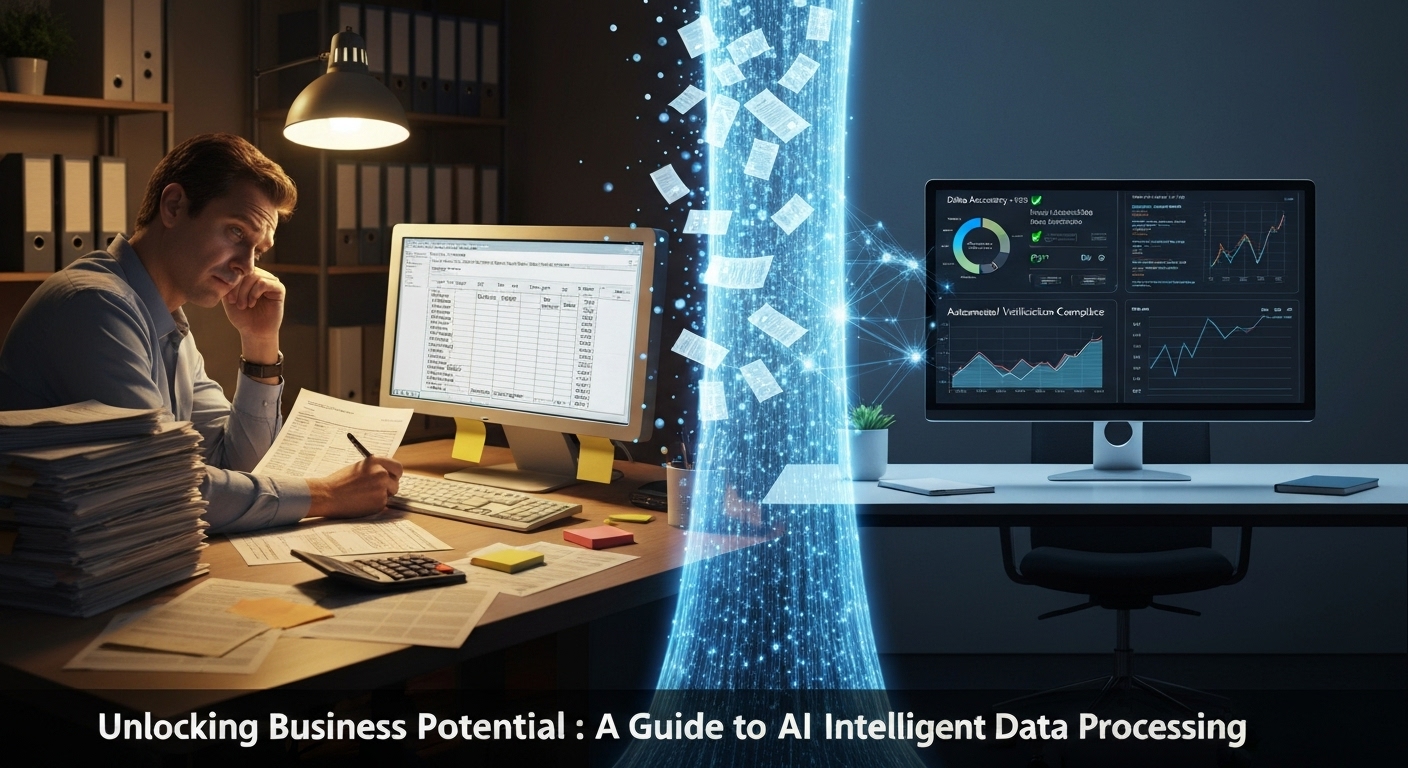Unlocking Business Potential : A Guide to AI for Intelligent Data Processing
AI for intelligent data processing is no longer a futuristic concept; it’s a foundational business strategy for organizations aiming to thrive in the digital age. In a world generating zettabytes of data, traditional methods of data handling are becoming obsolete. They are too slow, too prone to error, and incapable of extracting the deep, nuanced insights hidden within complex datasets. This is where artificial intelligence steps in, offering a powerful toolkit to automate, optimize, and revolutionize how we interact with information. By leveraging AI, businesses can transform raw, chaotic data into a strategic asset, driving smarter decisions, enhancing operational efficiency, and creating unprecedented value. This comprehensive guide will explore the transformative impact of AI on data processing. We will delve into the core technologies that make it possible, examine the tangible benefits for businesses, explore real-world applications across various industries, and look ahead to the future of this dynamic field. Understanding the principles of AI for intelligent data processing is crucial for any leader looking to build a resilient and forward-thinking enterprise.
What Exactly Is AI for Intelligent Data Processing?
At its core, AI for intelligent data processing refers to the use of artificial intelligence algorithms, particularly machine learning (ML), to analyze, categorize, interpret, and transform large volumes of data with minimal human intervention. Unlike traditional data processing, which relies on pre-programmed rules and structured data formats, AI-powered systems can learn from data, recognize patterns, and handle the complexity of unstructured information like text, images, and audio. This learning capability allows them to adapt and improve over time, becoming more accurate and efficient with each task. Think of it as the difference between a simple calculator and a skilled analyst. A calculator can perform predefined calculations flawlessly (traditional processing). An analyst, however, can look at a messy spreadsheet, understand the context, identify trends, flag anomalies, and make informed recommendations (intelligent processing). AI brings this analytical, cognitive capability to a massive scale, enabling what is often called cognitive data processing. It’s about moving beyond just managing data to truly understanding it.
The Shift from Manual to Intelligent Automation
Historically, data processing involved significant manual effort, from data entry and cleansing to analysis and reporting. This was not only time-consuming but also susceptible to human error. Intelligent automation, a key component of this AI-driven approach, changes this paradigm. It automates repetitive, high-volume tasks, freeing up human experts to focus on higher-value activities like strategy and innovation. The implementation of AI for intelligent data processing signifies a strategic move towards a more agile, data-centric operational model where insights are generated in real-time, enabling proactive rather than reactive decision-making. 
The Core Technologies Driving Intelligent Data Processing
The power of AI in data processing isn’t magic; it’s built on a foundation of sophisticated technologies that work in concert to mimic and augment human intelligence. Understanding these core components is key to appreciating the full scope of what’s possible.
Machine Learning (ML) and Deep Learning
Machine learning is the engine of AI for intelligent data processing. ML algorithms are trained on vast datasets to recognize patterns and make predictions without being explicitly programmed for each specific task. For example, an ML model can be trained to identify fraudulent transactions by learning from historical fraud data. Deep learning, a subset of ML, uses complex neural networks with many layers to solve even more intricate problems, such as image recognition and advanced natural language processing. This is the technology that powers everything from self-driving cars to sophisticated recommendation engines.
Natural Language Processing (NLP)
A significant portion of the world’s data is unstructured text: emails, social media posts, customer reviews, legal documents, and support tickets. Natural Language Processing (NLP) is the branch of AI that gives computers the ability to understand, interpret, and generate human language. In data processing, NLP is used for: 
- Sentiment Analysis: Automatically gauging public opinion from customer feedback or social media.
- Information Extraction: Pulling key information, like names, dates, and contract terms, from dense documents.
- Chatbots and Virtual Assistants: Providing instant customer support by understanding and responding to queries.
- Text Summarization: Condensing long articles or reports into concise summaries.
Computer Vision
Just as NLP handles text, computer vision processes visual information like images and videos. This technology enables machines to “see” and interpret the visual world. Applications in data processing include quality control on manufacturing lines (identifying defects), analyzing medical images (X-rays, MRIs) to detect anomalies, and processing satellite imagery for agricultural or environmental analysis. Using AI for intelligent data processing in this context turns visual data into a structured, analyzable resource.
Key Benefits of Using AI for Intelligent Data Processing
Adopting an AI-driven approach to data yields significant, measurable benefits that impact every facet of an organization. These advantages go beyond simple cost savings and represent a fundamental enhancement of business capabilities.
Enhanced Accuracy and Efficiency
Intelligent automation eliminates the manual, error-prone tasks that bog down traditional workflows. AI systems can process data 24/7 with a level of consistency and accuracy that is impossible for humans to maintain, especially at scale. This leads to higher quality data, faster turnaround times, and a dramatic reduction in operational costs. For businesses handling large volumes of invoices, claims, or forms, this efficiency gain is transformative.
Unlocking Insights from Unstructured Data
Up to 80% of an organization’s data is unstructured. This wealth of information has historically been difficult and expensive to analyze. With technologies like NLP and computer vision, AI for intelligent data processing unlocks this hidden value. Businesses can now analyze customer emails, call transcripts, and social media chatter to gain an unprecedented understanding of customer sentiment, market trends, and emerging issues. For more information on powerful data solutions, you can explore offerings at flashs.cloud.
Predictive Analytics and Forecasting
One of the most powerful applications of machine learning for data analysis is predictive analytics. By analyzing historical data, AI models can identify trends and predict future outcomes with a high degree of accuracy. This enables businesses to:
- Forecast Demand: Optimize inventory and supply chain management.
- Predict Customer Churn: Proactively identify and retain at-risk customers.
- Anticipate Maintenance Needs: Implement predictive maintenance for machinery to prevent costly downtime.
These predictive capabilities allow organizations to be proactive and strategic, shaping future outcomes rather than just reacting to past events.
Real-World Applications Across Industries
The theoretical benefits of AI for intelligent data processing are being realized in practical applications across virtually every sector of the economy. Here are just a few examples of how different industries are leveraging this technology.
Finance and Banking
The financial sector relies heavily on accurate and timely data processing. AI is used for real-time fraud detection, algorithmic trading, automated credit scoring, and ensuring regulatory compliance (RegTech). NLP is also used to analyze financial reports and news to inform investment strategies. This extensive use of data mining with AI helps institutions manage risk and improve customer service.
Healthcare and Life Sciences
In healthcare, AI helps in analyzing medical records, diagnostic images, and clinical trial data. This accelerates drug discovery, enables personalized treatment plans, and helps predict disease outbreaks. For instance, AI algorithms can analyze an MRI scan to detect signs of a tumor much faster and sometimes more accurately than the human eye, acting as a powerful tool for radiologists. This application of AI for intelligent data processing is revolutionizing patient outcomes. 
Retail and E-commerce
Retailers use AI to create highly personalized customer experiences. Recommendation engines, powered by machine learning, suggest products based on a user’s browsing history and past purchases. AI also optimizes pricing strategies, manages inventory through demand forecasting, and analyzes customer feedback to improve products and services. The result is increased customer loyalty and higher sales.
Challenges and Considerations in Implementation
While the potential of AI for intelligent data processing is immense, the journey to successful implementation is not without its challenges. Organizations must be prepared to address several key issues:
- Data Quality and Governance: AI models are only as good as the data they are trained on. Poor quality, biased, or incomplete data will lead to inaccurate and unreliable results. Establishing strong data governance and cleansing practices is a critical first step.
- Talent and Skill Gaps: There is a significant shortage of professionals with expertise in AI, machine learning, and data science. Businesses must invest in training their existing workforce and attracting new talent.
- Integration and Scalability: Integrating AI solutions with existing legacy systems can be complex. The chosen solutions must also be scalable to handle growing data volumes and evolving business needs.
- Ethical Considerations and Explainability: As AI makes more critical decisions, issues of bias, transparency, and accountability become paramount. Businesses need to ensure their AI systems are fair and that their decision-making processes can be explained and audited (Explainable AI or XAI). According to experts, building trust in AI is a major hurdle, a sentiment echoed in many industry reports, as detailed by forbes.com.
The Future of AI in Data Management
The field of AI for intelligent data processing is continuously evolving. The future promises even more sophisticated capabilities that will further integrate AI into the fabric of business operations. We are moving towards a future of hyper-automation, where AI not only processes data but also orchestrates entire business processes. The synergy between AI, the Internet of Things (IoT), and blockchain will create secure, intelligent ecosystems that operate with unprecedented autonomy and efficiency. As AI models become more powerful and accessible, their adoption will become less a matter of competitive advantage and more a matter of survival.
Conclusion: Embracing the Data Intelligence Revolution
In conclusion, the integration of AI for intelligent data processing represents a paradigm shift from data management to data intelligence. It empowers organizations to move beyond simply collecting and storing data to actively using it as a strategic asset for growth and innovation. By harnessing the power of machine learning, NLP, and other AI technologies, businesses can automate complex processes, unlock deep insights from all types of data, and make smarter, forward-looking decisions. While challenges exist, the immense potential for enhanced efficiency, improved accuracy, and profound business intelligence makes the adoption of AI-powered analytics an essential journey for any modern enterprise looking to secure its future.
HOTLINE
+84372 005 899


